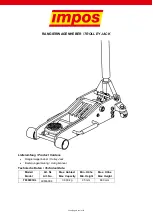
INSTRUCTIONS FOR :
aIR OPERaTED JaCKS
TELESCOPIC
Important: REaD ThESE InSTRuCTIOnS CaREfuLLy. nOTE ThE SafE OPERaTIOnaL REQuIREMEnTS, WaRnInGS anD CauTIOnS.
uSE ThIS JaCK CORRECTLy anD WITh CaRE fOR ThE PuRPOSE fOR WhICh IT IS InTEnDED. faILuRE TO DO SO May CauSE
DaMaGE anD/OR PERSOnaL InJuRy, anD WILL InvaLIDaTE ThE WaRRanTy. RETaIn ThESE InSTRuCTIOnS fOR fuTuRE uSE.
Thank you for purchasing a Sealey jack. Manufactured to a high standard this product will, if used according to these instructions and properly
maintained, give you years of trouble free performance.
1. SafETy InSTRuCTIOnS
2. SPECIfICaTIOnS
Note: The maximum heights shown may be extended by use of the
extension pins
MODEL No's
yaJ15-30
yaJ15-30DC
yaJ20-40
yaJ20-40DC
yaJ20-40LR
Disconnect jack from air supply before changing parts, servicing
or performing any maintenance.
WaRnInG!
Ensure correct air pressure is maintained and not
exceeded. Recommended pressure 116-145psi or 174psi for
YAJ20-40LR. Required air flow 10.5cfm or 11.5cfm for
YAJ20-40LR.
Keep air hose away from heat, oil and sharp edges. Check air
hose for wear before each use, and ensure that all connections
are secure.
Ensure Jack is kept clean and in good working order. Immediately
repair or replace damaged parts.
Use recommended parts only. Incorrect parts may be dangerous
and will invalidate the warranty.
Use a qualified person to lubricate and maintain the jack.
DO nOT
use brake fluid to top up system. Use Sealey hydraulic
oil only.
Locate jack in a suitable, well lit work area. Keep area clean and
tidy and free from unrelated materials.
Use jack on level & solid ground, preferably concrete.
Avoid
tarmacadam since jack may sink in
.
Place wedges under wheels of vehicle (
but ensure wheels of jack
can freely move).
Ensure the vehicle handbrake is engaged (or in “PARKED”
mode), and switch the engine off.
Ensure minimum distance of 0.5m between vehicle tilt & static
objects such as doors, walls, etc.
Ensure all non essential persons keep a safe distance and that
there are no passengers in the vehicle to be jacked up.
Place jack under vehicle manufacturer’s recommended jacking
points
(see vehicle handbook).
Check that the jacking point is stable and centred on the jack
saddle and is free from grease or oil.
Ensure jack wheels are free to move and that there are no
obstructions.
DanGEr: Use jack for lifting only, NOT for supporting the raised
load
.
Use correctly rated axle stands under vehicle before
proceeding with task.
DO nOT
apply your body weight to the handle during jacking.
The handle is only for moving the jack to and from the lifting
location.
DO nOT
operate the jack if parts are missing or damaged.
DO nOT
exceed the rated capacity of the jack.
DO nOT
allow the vehicle to move during lifting and do not use
the jack to move the vehicle.
DO nOT
jack a vehicle which may result in the spillage of fuel,
battery acid, or dangerous substances.
DO nOT
work under the vehicle until Axle Stands have been
correctly positioned.
DO nOT
use the jack for purposes other that than which it is
designed for.
DO nOT
adjust the safety overload valve.
DO nOT
yank the hose from the air supply, and
DO nOT
direct
air from the air hose at yourself or others.
Ensure there are no persons or obstructions beneath the vehicle
before lowering.
When not in use disconnect jack from the air supply, and store in
the lowered position in a safe, dry, childproof area.
WarnInG! Turn off air supply and de-pressurise the control
nozzle before removing the pump unit from any installation or
mobile system.
Failure to comply with this instruction may damage the unit and
will invalidate your warranty.
Original Language Version
YAJ15-30, YAJ15-30DC, YAJ20-40,
YAJ20-40DC, YAJ20-40LR
Issue 2 - 13/03/12
3.1.
Ideal for workshop or roadside use, these jacks take the effort
out of lifting heavy plant, tractors and commercial vehicles.
Models feature dead man's control for extra safety
(detachable on Model No's YAJ15-30DC and YAJ20-40DC
making these models extremely portable) and multi-position
locking handles. Each jack is supplied with a 45mm and
75mm extension to help close the gap between the saddle of
the jack and the jacking point. Model No. YAJ20-40LR also
offers a long reach chassis, ideal for accessing deep set
jacking points.
3. InTRODuCTIOn
Model no yaJ15-30 yaJ15-30DC yaJ20-40 yaJ20-40DC yaJ20-40LR
Maximum
Capacity
30Tonne
30Tonne
40Tonne
40Tonne
40Tonne
Minimum
height
175mm
150mm
175mm
150mm
190mm
Maximum height/Capacity (mm/Tonne)
Stage 1
472/15
409/15
472/20
409/20
504/20
Stage 2
393/30
343/30
393/40
343/40
416/40
Extension
45/75mm
45/75mm
45/75mm
45/75mm
45/75mm
Chassis
Length
480mm
430mm
480mm
430mm
770mm
Length inc. handle
Position 1
460mm
1280mm
460mm
1280mm
820mm
Position 2
1380mm
1600mm
1380mm
1600mm
1770mm
Position 3
1700mm
-
1700mm
-
2100mm
Width
290mm
290mm
290mm
290mm
282mm
Working
Pressure
116-
145psi
116-
145psi
116-
145psi
116-
145psi
116-
174psi
air flow
10.5cfm
10.5cfm
10.5cfm
10.5cfm
11.5cfm
Weight
39kg
31kg
41kg
33kg
62kg
4. aSSEMBLy
4.1.
attaching the handle - yaJ15-30, yaJ20-40, yaJ20-40LR
4.1.1. Remove a circlip from either side of the large pin (fig.1A).
4.1.2. Slide out the pin and place the handle into the opening. Slide
the pin back through the jack, lining up the handle and
through the other side. Secure with circlips.
4.2.
air hoses - yaJ15-30, yaJ20-40, yaJ20-40LR
4.2.1. Screw in the two air hoses from the handle into the jack.
4.2.2. The hose marked orange must be screwed into the left-hand
side. The hose marked black or clear into the right-hand side.
(fig.1).
4.2.3. Ensure the hoses are tight and do not obstruct the movement
of the handle.





















